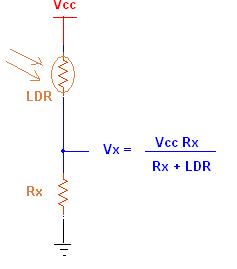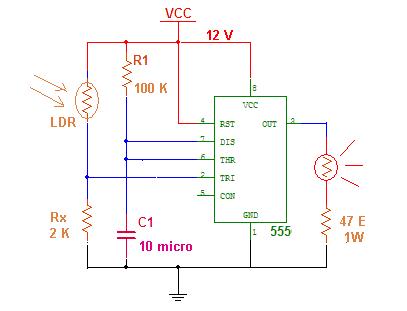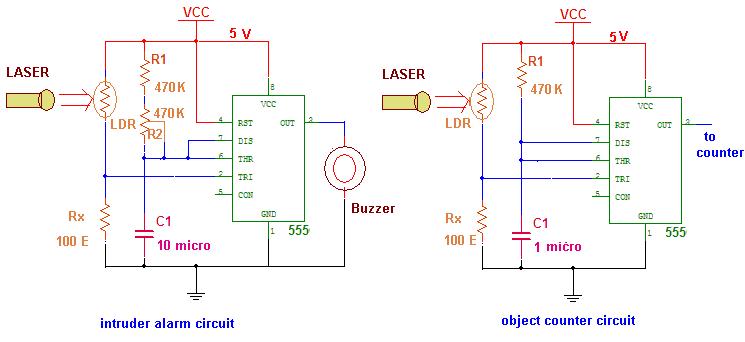You might have seen so many applications and circuits based on monostable multivibrator using IC555 like intruder alarm, automatic night lamp, smoke detector, fire alarm, automatic gate controller, object counter etc. In all such circuits monostable multivibrator is used. We may easily understand the operation of the circuit but many of us don’t know how such circuits are designed. So here I will try to explain how such circuits are designed using some examples.
To detect the light we need any photo sensor and the LDR is one of the most convenient photo sensor. It works on photo conductivity principal. That means its resistance varies as light falls on it. In absense of light the resistance of LDR is maximum and as light intensity increases the resistance decreases. So we can use this property in designing this circuit. As the resistance of LDR changes, the voltage across it also changes and this voltage is used to trigger monostable multivibrator.
You might have seen so many applications and timer circuits based on monostable multivibrator using IC555 like intruder alarm, automatic night lamp, smoke detector, fire alarm, automatic gate controller, object counter etc. In all such circuits monostable multivibrator is used. We may easily understand the operation of the circuit but many of us don’t know how such circuits are designed. So here I will try to explain how such circuits are designed using some examples.
Automatic night lamp or dark room light
To detect the light we need any photo sensor and the LDR is one of the most convenient photo sensor. It works on photo conductivity principal. That means its resistance varies as light falls on it. In absense of light the resistance of LDR is maximum and as light intensity increases the resistance decreases. So we can use this property in designing this circuit. As the resistance of LDR changes, the voltage across it also changes and this voltage is used to trigger monostable multivibrator.
For this first we have to measure the resistance of LDR in two conditions
{ 1. In absense of light (in dark room)
{ 2. In room light
I have measured the resistance of one of the LDR which has values of 4300? and 270? in these two conditions. Now we need to make an arrengement in such a way that in darkroom when resistance is around 4.3 K?, it should generate trigger that means the voltage should fall below 1/3 Vcc. So I have made a voltage divider circuit using LDR and a fixed value of resistor as shown. Now here we need to do some simple calculations to find out the value of this fixed value resistance Rx.
As we know from voltage divider rule

Fig. 1: Image Showing Voltage Divider Rule
Vx = Vcc ×Rx / (LDR + Rx)
In this equation, as I said when LDR value becomes 4300, the Vx should be 1/3 Vcc
So 1/3Vcc = Vcc ×Rx / (4300 + Rx)
1/3 = Rx / (4300 + Rx)
4300 + Rx = 3×Rx
So 2×Rx = 4300 or Rx = 2150
If we take nearest available value slightly lower then this as Rx = 2000 ?. We may get Vx as lower then 1/3 Vcc in absense of light. And that is all we want. During normal light (room light) the LDR resistance is around 300 ?.
So Vx = Vcc × 2000 / (2000 + 300)
Vx = 0.87 Vcc (that is obviously > 1/3 Vcc)
So during room light trigger is not generted. But in the dark, the resistance of LDR increases to 4300 ? and Vx becomes < 1/3 Vcc, that generates trigger.
Now what to do next is very easy. Just apply this Vx at the trigger input of IC555 configured in monostable mode. So it will generate high output when there is no light. As shown in figure because the output drives DC lamp, the lamp will be automatically ON in dark.

The time period for monostable is not very important here because the trigger is continuous. So the output will be continuously high. The time period should be prefreablely shorter then 1 second so that the response time becomes faster (that means as you change from light to dark and dark to light areas the lamp will be immediately ON or OFF)
Intruder alarm or object counter :–
This also utilizes the same LDR and same triggring circuit for monostable multivibrator. But for light source it uses LASER or any other strong light source. So now we have to calculate value of LDR in presence of LASER and in absense of LASER.
first we measure LDR value in normal light (day light or room light) that we know as around 300 ?. Next we measure LDR value infront of LASER light that is around 80 ?. Based on this let us calculate value of Rx. We need to generate trigger when laser light is interrupted that means LDR value is 300 ?.
So Vx = Vcc×Rx / (300 + Rx)
1/3 Vcc = Vcc ×Rx / (300 + Rx)
300 + Rx = 3×Rx
Rx = 150 ?
If we choose Rx as next available lower value of 100 ? then, till laser light is falling
Vx = Vcc ×100 / (80 + 100)
Vx = 0.55 Vcc (that is > 1/3 Vcc)
That means trigger is not generated but as laser light interrupts Vx becomes less then 1/3 Vcc and it generates trigger.
Next is same as above example. Apply this Vx to trigger input of IC555 configured in monostable mode. So its output goes high when laser light is interrupted.

Fig. 3: Circuit Diagram of Intruder Alarm and Object Counter
If its intruder alarm application a buzzer may be connected at the output and time period is adjusted from 5 to 10 seconds. So in normal condition when laser light is continuously falling on LDR, there is no sound. But as laser light interrupted (anyone passes between LASER and LDR and cuts the light) the buzzer sounds. A potentiometer is used in timing components to increase the time duration of buzzer sound. The monostable multivibrator is designed for variable time period output from 5 sec to 10 sec
In object counter application, the object passes between LASER and LDR that cuts the light. It genrates short duration pulse that is given to input of digital counter. The time period must be chosen depending upon the number of objects to be counted per second. I have designed it for 0.5 sec time so that atleast it can count 100 objects / second.
;
Filed Under: Electronic Projects


Questions related to this article?
👉Ask and discuss on Electro-Tech-Online.com and EDAboard.com forums.
Tell Us What You Think!!
You must be logged in to post a comment.